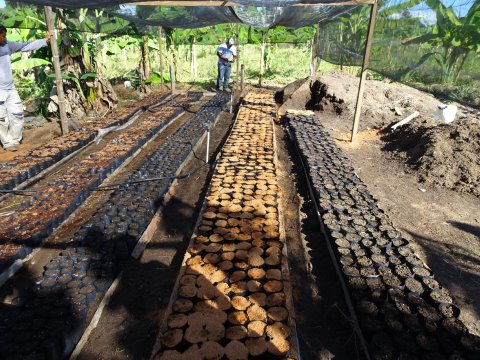Teaming for Interdisciplinary Research Pre-Seed Program
Adaptive Smallholder Agriculture in a Changing Climate

Adaptive Smallholder Agriculture in a Changing Climate

Over two billion people pursue natural resource-dependent livelihoods, and roughly 80% of people in the world depend on food produced by smallholder agriculture systems. These livelihoods, the people dependent on their success, and associated ecosystems are under increasing pressure due to a changing climate and agricultural policies that fail to support small-scale farming and ranching enterprises. Ensuring livelihoods, food security, and ecosystem health requires creative, flexible, and locally appropriate adaptations that are adequately supported by policy institutions. This team of UGA faculty focuses on developing research opportunities to support the resilience, sustainability, and livelihood success of small-scale agriculturalists in the Global South. The team integrates decades of experience in small-scale agriculture systems with expertise in governance systems, institutions, tropical forest and dryland ecologies, agroforestry, food systems, rural livelihoods, participatory action research, and policy outreach.
The initial geographical focus of the team is the Brazilian Amazon and the drylands of India. While the specifics of agricultural livelihoods are different in these regions, there are common concerns that are critical for developing resilient agriculture. The Amazon is a linchpin of global carbon and hydrological cycles and a hotspot of diverse species and livelihoods. For centuries, this region has been a source of globally important crops and agricultural technologies, yet climate change is now disrupting Amazonian agroforestry systems and the forests they protect. Changes in the Amazonian water cycle and fire regime are producing historic droughts and fires and altering growing seasons, pest pressures, and forest composition. In India, agriculture is crucially dependent on a favorable southwest summer monsoon to secure water for irrigation. Increased variability in monsoons and over-appropriation of groundwater resources are resulting in water shortages and poor crop yields.
The outcomes of our working group will be competitive proposals for major external funding. Additionally, we expect the proposal development process to catalyze collaborative research and publishing efforts between UGA and external partners related to climate change adaptation for smallholder agricultural communities. Partnerships developed through this working group will provide a basis for long-term community-based research. We envisage this group leading to subsequent major proposals for replication and extension in other tropical regions and in non-tropical forest biomes, positioning UGA as a leader in applied community-based agricultural research.
Team Lead
Sechindra Vallury
sv19473@uga.edu
College: Odum School of Ecology
Department: Odum School of Ecology
Team Members
Donald Nelson
dnelson@uga.edu
College: Franklin College of Arts & Sciences
Department: Anthropology
Gregory Thaler
gthaler@uga.edu
College: School of Public & International Affairs
Department: International Affairs
Emily Bell
evbell@uga.edu
College: School of Public & International Affairs
Department: International Affairs
John Schmidt
jpschmidt270@gmail.com
College: Odum School of Ecology
Department: Odum School of Ecology
Giovanni Dazzo
giovanni.dazzo@uga.edu
College: College of Education
Department: Lifelong Education Administration, and Policy
Jennifer Thompson
jjthomp@uga.edu
College: College of Agricultural & Environmental Sciences
Department: Crop & Soil Sciences
Daniel Markewitz
dmarke@uga.edu
College: Warnell School of Forestry
Department: Warnell School of Forestry
